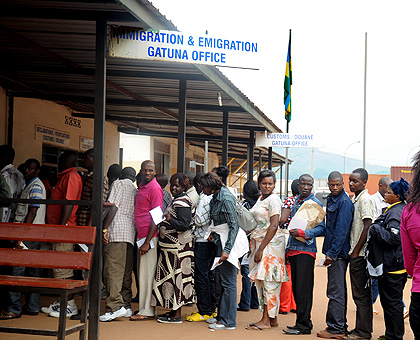The issue of work permit fees in the East African Community (EAC) has again raised debate with some individuals saying it should be abolished while others believe it should remain as a source of revenue for the partner states.


The issue of work permit fees in the East African Community (EAC) has again raised debate with some individuals saying it should be abolished while others believe it should remain as a source of revenue for the partner states.Proponents of the abolition of the fees consider it as an impediment to free movement of workers within the community.Among all the five partner states, only Rwanda has waived work permit fees on citizens of the regional bloc, only requiring them to renew the permits periodically but at no cost.In their sitting in Kigali, April this year, members of the East African Legislative Assembly (EALA) recommended that the other partner states follow Rwanda’s lead and waive the fees. That means that workers would move and work freely within the bloc.A consensus was reached after a long debate between the Assembly and the Council of Ministers. But six months later, the situation remains unchanged. Some partner states still say permits be maintained for purposes of identification, but fees be scrapped.However, six months after the decision by the regional legislators, most countries have continued charging the fees.Harmonising policies Michael Baingana, a research and policy advisor at the East African Business Council (EABC), says it’s not prudent to abolish the fees, but instead countries should harmonise the policies and fees. "Work permits per se is not an issue. We need to understand that our countries really generate revenues from them. So, my take is that there is need to manage this progressively, this is why starting with harmonisation of fees, forms and procedures is key,” he said in an interview with The New Times yesterday. "Having the same fees, same forms, and procedures is the right starting point. EALA rushed in suggesting abolition. How do you abolish when countries have not even liberalised? What should come first? The answer is, there is need to take consideration of the macroeconomic situation partner states are in,” he said.The scrapping of work permit fees was first implemented bilaterally between Rwanda and Kenya, before Kigali later extended it to the citizens from the other partner states. Permit fees have always been considered a non-tariff barrier to the full implementation of the Common Market Protocol, through curtailing the movement of labour.The Secretary General of EAC, Dr Richard Sezibera, said it would be better to totally waive the fees, saying they have remained a stumbling block to the EAC citizens."I prefer removal of the fees. Yes, we have an ongoing process of harmonisation. Uganda and Burundi have committed to joining Rwanda in removing them,” he responded to this reporter’s enquiry yesterday.The fees charged to obtain work permits vary between partner states. For example, in Tanzania, a permit costs between $6 and $3,000, while, in Uganda, it ranges from $250 to $2,500. Burundi charges between $ 60 and $84 for a regular worker. Anne A Eboi, a Kenyan lecturer at Mount Kenya University - Kigali campus, said that fees should be charged, but harmonised because they are source of revenue."It’s a good idea but I don’t think we have reached that level of waiving the fees since our countries are still poor and need the revenue,” she noted.She said she has never paid for permit fees in Rwanda.John Kalisa, the national programmes coordinator of TradeMark East Africa, said it was important to totally eliminate the fees adding revenue would be obtained from the income earned by the workers, through pay as you earn."You cannot call for free movement of labour and then charge work permit fees at the same time. Partner states need to totally abolish the fees,” he said.Article 10 of EAC Common Market Protocol on free movement of workers, says that "the office responsible for the employment in a partner state shall facilitate a citizen of another partner state who seeks employment in the territory of that partner state to receive the same assistance as would be accorded to a citizen of that partner state who seeks employment.”During the EALA session in Kigali, Tanzania’s Deputy EAC minister, Abdullah Saadall said there was a need to first harmonise the national laws before a total waiver.


